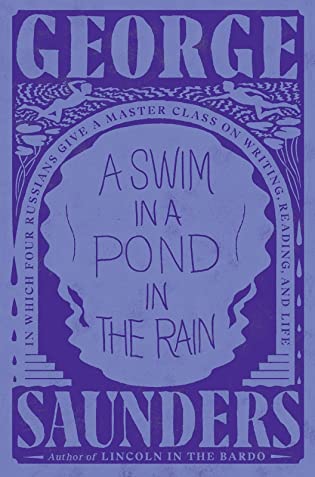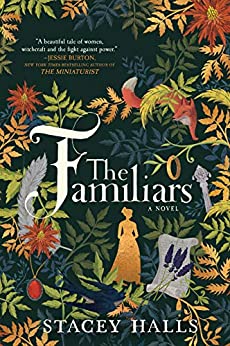I finished a couple of books this week and decided to roll the reviews together.
 A Swim in a Pond in the Rain: In Which Four Russians Give a Master Class on Writing, Reading, and Life by George Saunders
A Swim in a Pond in the Rain: In Which Four Russians Give a Master Class on Writing, Reading, and Life by George Saunders Published by Random House on January 12, 2021
Length: 14 hours 44 minutes
Format: Audio, Audiobook
Source: Audible
Buy on Amazon, Buy on Bookshop
This post contains affiliate links you can use to purchase the book. If you buy the book using that link, I will receive a small commission from the sale.
Goodreads
For the last twenty years, George Saunders has been teaching a class on the Russian short story to his MFA students at Syracuse University. In A Swim in a Pond in the Rain, he shares a version of that class with us, offering some of what he and his students have discovered together over the years. Paired with iconic short stories by Chekhov, Turgenev, Tolstoy, and Gogol, the seven essays in this book are intended for anyone interested in how fiction works and why it’s more relevant than ever in these turbulent times.
In his introduction, Saunders writes, “We’re going to enter seven fastidiously constructed scale models of the world, made for a specific purpose that our time maybe doesn’t fully endorse but that these writers accepted implicitly as the aim of art—namely, to ask the big questions, questions like, How are we supposed to be living down here? What were we put here to accomplish? What should we value? What is truth, anyway, and how might we recognize it?” He approaches the stories technically yet accessibly, and through them explains how narrative functions; why we stay immersed in a story and why we resist it; and the bedrock virtues a writer must foster. The process of writing, Saunders reminds us, is a technical craft, but also a way of training oneself to see the world with new openness and curiosity. A Swim in a Pond in the Rain is a deep exploration not just of how great writing works but of how the mind itself works while reading, and of how the reading and writing of stories make genuine connection possible.
My husband and I listened to this on audiobook. He has been trying to get me to read George Saunders since an aborted attempt at Lincoln in the Bardo. I just couldn’t follow that one on audio, but I do want to try to read it in print. I see this book as a companion to Thomas C. Foster’s How to Read Literature Like a Professor. Essentially, it’s a master class in how literature works using short stories by several Russian authors as a focus for analysis. If I had to pick a favorite short story, it would probably be “The Nose” (Chekov) or perhaps “Alyosha the Pot.” The book has a wonderful cast of narrators, including Rainn Wilson, B. D. Wong, Glenn Close, Phylicia Rashad, and Nick Offerman. Saunders narrates the analytical parts. I bought a print copy for use in my classroom. I’m not yet sure how I might use it, but I can see the potential.
 The Familiars by Stacey Halls
The Familiars by Stacey Halls Published by MIRA on February 19, 2019
Genres: Historical Fiction
Pages: 335
Format: E-Book, eBook
Source: Library
Buy on Amazon, Buy on Bookshop
This post contains affiliate links you can use to purchase the book. If you buy the book using that link, I will receive a small commission from the sale.
Goodreads
Young Fleetwood Shuttleworth, a noblewoman, is with child again. None of her previous pregnancies have borne fruit, and her husband, Richard, is anxious for an heir. Then Fleetwood discovers a hidden doctor’s letter that carries a dire prediction: she will not survive another birth. By chance she meets a midwife named Alice Gray, who promises to help her deliver a healthy baby. But Alice soon stands accused of witchcraft.
Is there more to Alice than meets the eye? Fleetwood must risk everything to prove her innocence. As the two women’s lives become intertwined, the Witch Trials of 1612 loom. Time is running out; both their lives are at stake. Only they know the truth. Only they can save each other.
Rich and compelling, set against the frenzy of the real Pendle Hill Witch Trials, this novel explores the rights of 17th-century women and raises the question: Was witch-hunting really women-hunting? Fleetwood Shuttleworth, Alice Gray and the other characters are actual historical figures. King James I was obsessed with asserting power over the lawless countryside (even woodland creatures, or “familiars,” were suspected of dark magic) by capturing “witches”—in reality mostly poor and illiterate women.
I love reading books about witches, “real” or not, and I wanted to like this book more. It was compelling enough for me to finish; however, some of the author’s choices were perplexing. I didn’t find the protagonist, Fleetwood Shuttleworth, to be all that engaging, and I kept thinking about how much more interesting the story might have been if the protagonist had been one of the accused witches. It seems like a missed opportunity to me to have a relatively privileged outsider tell the story of the Pendle Witch Trials. Also, Fleetwood rides a horse all over Creation while hugely pregnant. I’m not sure how she got on the horse, never mind rode it, in that condition. Granted, I’m not a horsewoman, so what do I know. Another issue I had was that Fleetwood discovers early in the book, within the first few pages, that her husband is secretive, and she finds he’s hiding even more important information. They have a falling out, and it seems implausible when they reconcile. The author didn’t really lay the groundwork for that reconciliation to make sense. Still, I did learn some things about this interesting historical event.